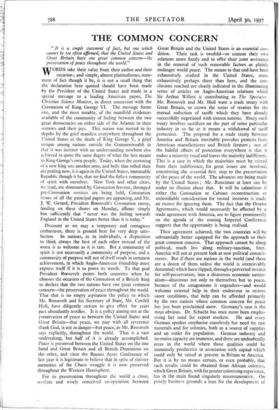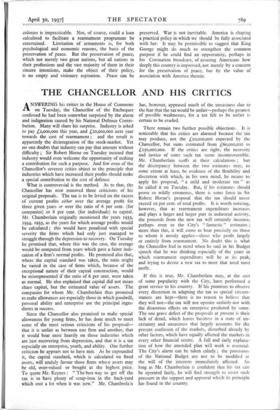THE COMMON CONCERN
" It is a simple statement of fact, but one which cannot be too often affirmed, that the United States and Great Britain have one great common concern--the preservation of peace throughout the world."
WORDS take their value from their author and their occasion ; and simple, almost platitudinous, state- ment of fact though it be, it is not a small thing that the declaration here quoted should have been made by the President of the United States and made in a special message to a leading American paper, The Christian Science Monitor, in direct connexion with the Coronation of King George VI. The message forms one, and the most notable, of the manifold evidences available of the community of feeling between the two great democracies on either side of the Atlantic in their sorrows and their joys. This nation was moved to its depths by the grief manifest everywhere throughout the United States at the death of King George V, a grief unique among nations outside the Commonwealth in that it was instinct with an understanding nowhere else achieved in quite the same degree of what the loss meant to King George's own people. Today, when the crowning of a new king sets another note, and bells that tolled then are pealing now, it is again in the United States, immutable Republic though it be, that we find the fullest community of spirit with ourselves. New York and other cities, we read, are dominated by Coronation fervour, thronged pre-Coronation services are being held, Coronation issues of all the principal papers are appearing, and Mr. J. W. Gerard, President Roosevelt's Coronation envoy, landing on these shores on Monday, affirms simply but sufficiently that " never was the feeling towards England in the United States better than it is today."
Discount as we may a temporary and contagious enthusiasm, there is ground here for very deep satis- faction. In nations, as in individuals, a disposition to think always the best of each other instead of the worst is as welcome as it is rare. But a community of spirit is not necessarily a community of purpose, and a community of purpose will not of itself result in common achievement, in which Anglo-American friendship must express itself if it is to prove its worth. To that goal President Roosevelt points both countries when he chooses the occasion of the Coronation of a British king to declare that the two nations have one great common concern—the preservation of peace throughout the world. That that is no empty aspiration the policy to which Mr. Roosevelt and his Secretary of State, Mr. Cordell Hull, have diligently striven to give effect for years past abundantly testifies. It is a policy aiming not at the preservation of peace as between the United States and Great Britain—that peace, we may with all reverence thank God, is not in danger—but peace, as Mr. Roosevelt says explicitly, throughout the world. That is a vast undertaking, but half of it is already accomplished. Peace is preserved between the United States on the one hand and Great Britain and all British Dominions on the other, and since the Buenos Ayres Conference of last year it is legitimate to believe that in spite of sinister memories of the Chaco struggle it is now preserved throughout the Western Hemisphere.
For its preservation throughout the world a close, resolute and wisely conceived co-operation between
Great Britain and the United States is an essential con- dition. Their task is twofold—to cement their own relations more firmly and to offer their joint assistance in the removal of such removable factors as plainly endanger world peace. The means to that end have been exhaustively studied in the United States, more exhaustively perhaps there than here, and the con- clusions reached are clearly indicated in the illuminating series of articles on Anglo-American relations which Sir Arthur Willert is contributing to The Spectator. Mr. Roosevelt and Mr. Hull want a trade treaty with Great Britain, to crown the series of treaties for the mutual reduction of tariffs which they have already successfully negotiated with sixteen nations. Every such treaty involves sacrifices on the part of some particular industry in so far as it means a withdrawal of tariff protection. The proposal for a trade treaty between America and Britain inevitably provokes protests from American manufacturers and British farmers ; one of the baleful effects of protection everywhere is that it makes a minority vocal and leaves the majority indifferent. This is a case in which the majorities must be stirred from their indifference, for great issues are involved, constituting the essential first step to the preservation of the peace of the world. The advances are being made by the United States ; Mr. Runciman at least can be under no illusion about that. It will be calamitous if
either the Coronation or Cabinet reconstruction or unjustifiable consideration for vested interests is made an excuse for ignoring them. The fact that the Ottawa Agreements, which would necessarily be affected by a trade agreement with America, are to figure prominently on the agenda of the coming Imperial Conference suggests that the opportunity is being realised.
Their agreement achieved, the two countries will be substantially better equipped for the apprdach to their great common concern. That approach cannot be along political, much less along military-sanction, lines. America will not at present look at new political commit- ments. But if there are nations in the world (and there are a dozen of them unless the world is irretrievably demented) which have slipped, through a perverted instinct for self-preservation, into a disastrous economic nation- alism—disastrous not only to themselves but to peace, because of the antagonisms it engenders—and would welcome external help in their endeavour to restore saner conditions, that help can be afforded primarily by the two nations whose common concern for peace has just been proclaimed anew. Germany's case is the most obvious. Dr. Schacht has once more been empha- sising her need for export markets. He and every German speaker emphasise ceaselessly her need for raw materials and for colonies, both as a source of supplies and an outlet for population. German industry and inventive capacity are immense, and there are undoubtedly areas in the world where those qualities could be immensely productive in association with capital which could only be raised at present in Britain or America. But it is by no means certain, or even probable, that such results could be obtained from African colonies, which Great Britain, with far greater colonising experience, has in the main found singularly unremunerative. On purely business grounds a loan for the development of colonies is impracticable. Nor, of course, could a loan calculated to facilitate a rearmament programme be entertained. Limitation of armaments is, for both psychological and economic reasons, the basis of the preservation of peace. But the preservation of peace, which not merely two great nations, but all nations in their professions and the vast majority of them in their sincere intentions, make the object of their policy, is no empty and visionary aspiration. Peace can be preserved. War is not inevitable. America is shaping a practical policy in which we should be fully associated with her. It may be permissible to suggest that King George might do much to strengthen the common purpose if he could find an opportunity, perhaps in his Coronation broadcast, of assuring Americans how deeply this country is impressed, not merely by a concern for the preservation of peace, but by the value of association with America therein.



































































 Previous page
Previous page